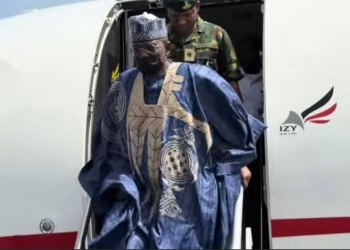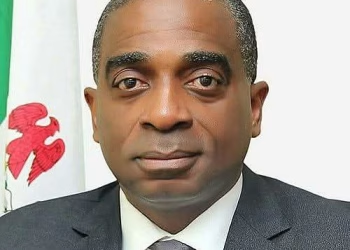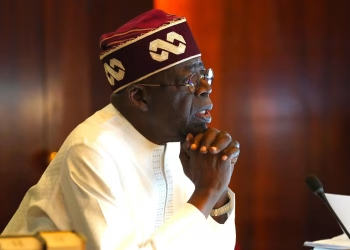President Bola Tinubu said on Monday in Abuja that the federal government will continue to prioritise the development of the digital economy to enhance youth empowerment and job creation.
The President made the pledge while receiving a report titled “Digital Economy, Youth Empowerment and Sustainable Job Creation in Nigeria: Issues, Challenges and Opportunities,” presented by participants of the Senior Executive Course 46 National Institute for Policy and Strategic Studies (NIPSS), Kuru.
In their eight-point recommendation, the course participants urged the Federal government to expedite the enactment of the Digital Economy and e-Governance Bill 2024 and encourage states to waive the Right of Way fees on deployment of telecoms infrastructure.
The 96 participants also recommended that the President issue an Executive Order mandating all MDAs to migrate to the OneGov.ng portal.
They advocated adopting a Quintuple-Helix Model to promote the digital economy, youth empowerment, and sustainable job creation.
Other recommendations were promoting long-term funding for the 3MTT scheme, accelerating the transition from IPv4 to IPv6, establishing Digital Health Innovation Hubs across Nigeria, and developing a preventive maintenance application for the nation’s automotive industry.
Responding, President Tinubu directed the Minister of Communications and Digital Economy to coordinate with the group and present their recommendations to the Secretary to the Government of the Federation and the Head of the Civil Service for streamlined implementation.
Emphasising the importance of youth empowerment through innovation and digital skills development, President Tinubu said:
“At the core of our administration is youth empowerment. We cannot relent on that, and we need everyone’s collaboration.
“I have listened carefully to your recommendations and the thorough work you did. We will continue to engage the Institute as a resource centre and Think Tank.
“As Nigeria’s foremost policy Think-Tank, you have highlighted the overlap of some government agencies, and we’ll look at that.
“You are an asset to our country, and I thank the participants for their dedication to their studies. We will continue to collaborate with you for the prosperity of our country.”
Highlighting the importance of data in national planning, President Tinubu told the meeting he had earlier met with officials from the National Population Commission (NPC) to discuss the upcoming census.
Prof. Ayo Omotayo, the Director-General of NIPSS, said during the year-long engagement, course participants undertook study tours across Nigeria and abroad, exploring the theme of their study.
“We recognise that in an era where technology drives innovation, Nigeria must aggressively leverage its youthful population to build a thriving ecosystem. The opportunities are boundless, from Fintech to Agri-Tech, E-Commerce to Artificial Intelligence.
“However, systemic challenges such as infrastructural deficits, inadequate digital skills, and regulatory bottlenecks must be addressed.
“Our findings highlight the urgent need for targeted policies that foster an enabling environment for startups, enhance access to finance, and expand broadband penetration.
“We believe that with your administration’s continued support, Nigeria will fully unlock the potential of the digital economy and create millions of sustainable jobs for our teeming youth,” he said.
The Minister of Communications and Digital Economy, Bosun Tijani, announced that the Digital Economy Bill, currently before the National Assembly, will undergo public hearings in all 36 states and the Federal Capital Territory (FCT) before its passage in the second quarter of 2025.
According to him, this is the first time legislation will be subjected to such an extensive review.
Regarding Right of Way fees, the Minister disclosed that 11 states have responded to the federal government’s request to waive the charges, a move aimed at facilitating broadband infrastructure expansion.
He expressed optimism that all states in the Federation would comply with this initiative before the end of the second year of the Tinubu administration.
On Nigeria’s progress in internet protocol transition, Tijani stated that the country is on track to become one of the first in Africa to migrate fully from IPv4 to IPv6.
He added that in 2024, the federal government approved a $2 billion investment into 90,000 kilometres of fibre optic cables to ensure nationwide broadband coverage.
This project will have the third-longest fibre network in Africa, following South Africa and Egypt.
According to the Minister, the project has made significant progress, with support from the Ministry of Finance and a $500 million commitment secured by the World Bank.
In his intervention, the Coordinating Minister of the Economy and Minister of Finance, Wale Edun, noted that the ICT sector contributed 16% to Nigeria’s GDP in 2024.
He emphasised the government’s commitment to prioritising the sector as crucial for economic stability and job creation.
He also recalled President Tinubu’s recent meeting with the Chief Executive of Flutterwave, during which the company pledged to support Nigerian youth and SMEs through technology-driven solutions with long-term economic impact.
“Flutterwave is considering listing on Nigeria’s Stock Exchange, and we expect this to strengthen the tech and payments ecosystem further,” he said.











